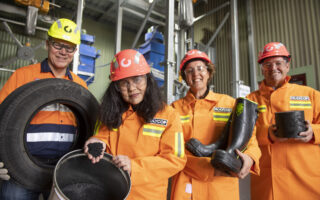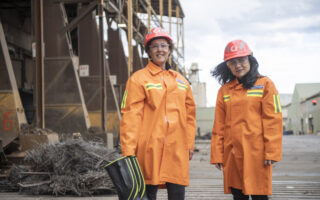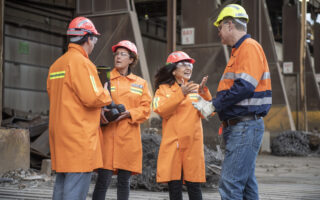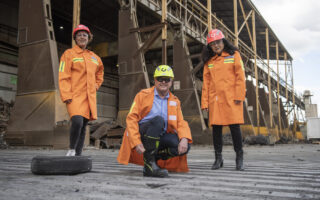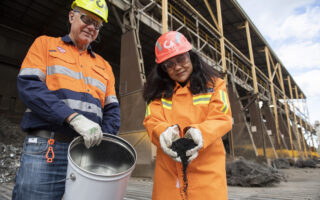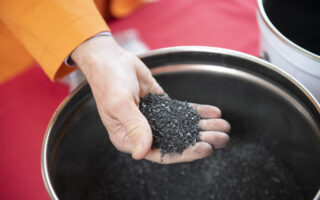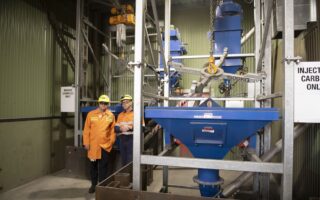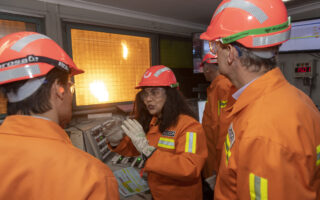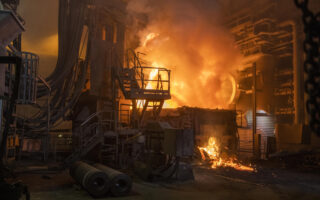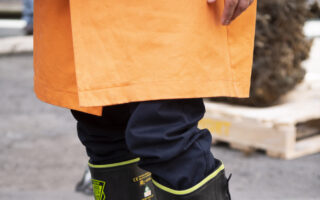Trains to roll on recycled tyres using next-generation Australian steel manufacturing process
A novel steel manufacturing process using waste rubber feedstock has been commercialised in a collaborative project with Australian steel manufacturer Molycop, the UNSW SMaRT Centre, footwear manufacturer Crawford Boots and the Advanced Manufacturing Growth Centre (AMGC).
The process involves maximising the recovery and utilisation of waste rubber from end-of-life vehicle tyres, conveyor belts and rubber safety boots as a substitute for imported carbonaceous material used in the company’s Electric Arc Furnace (EAF) in Newcastle.
The development of the new technology reduces Molycop’s reliance on imported carbonaceous materials by up to 20 per cent, while removing up to 90,000 tyres from landfill and reducing the steel maker’s electricity consumption, and scope one carbon emissions.
In practice, the company, alongside its partners, has developed a means to maximise the use of rubber crumb (polymer) as a source of carbon and hydrogen needed in the steel-making process.
Molycop’s President of Sustainability, Ian Tooze said that sustainability is core to the company’s strategy and integrated into how Molycop does business. Displacing fossil carbon materials is a key objective in Molycop’s decarbonisation pathway.
“We are investing in innovative solutions that improve the ways we reduce the consumption of virgin raw materials, recover valuable materials from waste streams, minimise waste and reduce our carbon footprint. What we have developed is yielding results and delivering outcomes for Molycop, our customers and communities in which we operate.”
“This project proves that Australia can develop and, critically, commercialise new and innovative ways to address waste and emissions that also benefits steelmakers’ bottom lines and the environment. Through AMGC we have bridged that commercialisation gap, developing a product, process and system that can now be offered to global EAF steelmakers.”
Director of the UNSW Sustainable Materials Research and Technology (SMaRT) Centre, Professor Veena Sahajwalla said it is crucial for manufacturers and researchers to work to tackle environmental issues, while delivering commercial outcomes.
“Climate change and clean energy narratives often overlook the need for more sustainable manufacturing and waste management practices, where we start to use waste resources for future manufacturing needs. Natural resources alone will not deliver the feedstock supply for all of society’s needs, so we need a far more sustainable approach, like some of the innovative recycling technologies we’ve developed at the UNSW SMaRT Centre.”
“By working collaboratively with Molycop we have been able to prove that polymer injection works and is commercially viable. It is only through partnerships like this that we can truly achieve positive environmental outcomes at scale.
“I encourage all manufacturers to engage with your local research institution and challenge them with a business issue that needs solving. Conversely, I recommend researchers go out into the field and work with industry because there are really interesting, practical challenges to solve.”
Penny Crawford, Founder of Crawford Boots, said that working alongside a large manufacturer and a researcher has broadened the company’s field of view.
“Being involved with this project has led to us looking at the entire life cycle of our products. From protecting the feet of workers in mines to how our boots are used at time of disposal, we now have revised our products to make them more suitable to polymer injection technology – collaborative programs like AMGC’s lift the entire manufacturing industry.”
As a result of the collaborative project, Molycop and its partners have now developed an exportable product and process which can be made available to global EAF operators.
AMGC’s Managing Director, Dr Jens Goennemann said commercialising great manufacturing ideas is where Australia future prosperity lies.
“Australia has an opportunity to transform from being a lucky country to a smart one through the commercialisation of great ideas that have local and global relevance. Together, Molycop, UNSW and Crawford Boots have manufactured a product that will reduce emissions and address waste in steel making, while generating more jobs and revenues for the nation – what more could you ask for?”
Molycop produces over 240,000 tonnes of steel each year, with its business producing train wheels, billet steel, steel bar and grinding media. Molycop has been collaborating since 2014 with Professor Veena Sahajwalla from University of NSW. Sahajwalla is an internationally regarded expert in recycling science, invented the award-winning Green Steel AKA Polymer Injection Technology in 2003, and has been developing it ever since.
Further details of the collaborative project are available from https://www.amgc.org.au/project/development-and-implementation-of-next-generation-of-polymer-injection-technology-in-steel-manufacturing/

